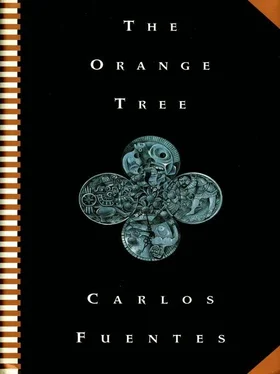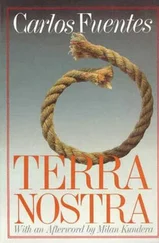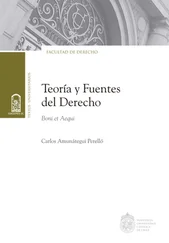MARTÍN 2
I’m not going to weep for my father. But as I am a good Christian — and I am — I must feel compassion for his fate. Just look at what happened to him after the fall of the Great Tenochtitlán and the conquest of the Aztec empire. Instead of staying in the capital to consolidate his power, he took it upon himself to embark on a mad, spectacular, noisy adventure in which he got lost and ruined himself in the jungles of Honduras. What worm did this man, our father, have within him that he could not rest with the fortune and glory he’d worked so hard to achieve but always had to be looking for more adventure and more action, even if it cost him both his fortune and his glory? It’s as if he felt that without action he would have gone back to being the humble son of the Medellín miller he was originally; as if action owed him an homage identical to itself — more action. He could not stand still to contemplate his accomplishments; he had to risk everything in order to deserve everything. Perhaps, aside from his little Christian God (which is ours too, let there be no doubt about that), he had within him a great big pagan god — savage, secular, and pitiless — who asked him to be everything, thanks to action.
To be everything: even to be nothing. There were two men inside him: one blessed by fortune, love, and glory, the other ruined by vanity, display, and mercy. What a strange thing to say about my dear old dad. Vanity and mercy united: one part of him needed recognition, wealth, and caprice as a way of life; the other demanded for us, his new Mexican people, compassion and rights. That he came to identify himself with us, with our land, may well be true. What is certain, something I learned from my mother, is that Hernán Cortés fought with the Franciscans, who demanded that the temples be pulled down, while my father asked that those houses of idols be left standing for memory’s sake.
And my brother Martín already told you that he intended in his testament to free the Indians and return their lands to them. Stillborn words. How many stillborn words. But you see, despite all of them, I recognize my father’s virtues. But being my mother’s son and speaking today with all the truth and clarity I possess — besides, when will I have another chance to do so? — I must confess that I was overjoyed by his failures. The contrast between the honors accorded him and the powers denied him tickled my fancy. He abandoned my mother and me when we got in the way of his political and matrimonial plans, so how could we not secretly take pleasure in his disasters? If he hadn’t abandoned the government of Mexico City to go off and conquer new lands in Honduras, his enemies would not have been able to strip him of authority and take over his property. Even if my father’s friends threw his enemies into cages, when he returned from Honduras he found that judges had arrived from Spain to try him and deprive him of his power to govern.
My Indian soul trembles in wonder. While my father was in Honduras, he tortured and hanged the last Aztec king, Cuauhtémoc, because he wouldn’t reveal the hiding place of Moctezuma’s treasure, and in Mexico City, my father’s friends were tortured to reveal the whereabouts of Cortés’s treasure and then hanged. When he returned to Mexico, my father was accused of all these things: of illicitly enriching himself, of protecting Indians, of poisoning his rivals with lethal cheeses, of not fearing God, of who knows what else …
I’m going to talk about the only thing that really fascinates and perturbs me: my daddy’s sexual life, its violence, its seduction, and the promiscuity of the flesh. He had myriad women according to the accusation, some in Mexico, others in Castile, and he had carnal knowledge of all of them, even if some were related to one another. He would send the husbands out of the city in order to deal freely with their wives. He had sexual relations with more than forty Indian women. He was also accused of murdering his legal wife, Catalina Xuárez, called La Marcaida. Jerónimo de Aguilar, the translator who had been shipwrecked on the Yucatan coast and rescued by my father, accused him of crimes, infinite corruption, and a rebellious desire to take possession of this land and rule over it himself. Six old, illiterate maids accused him of carnal abuses. Between the traitorous translator and the gossipy chambermaids, I interpose myself: I, Martín Cortés, the bastard, son of the loyal interpreter Doña Marina, also illiterate, but possessed by the demon of language. I interpolate myself because both sides, Aguilar and the old hags, agree that my birth is what drove the sterile Catalina Xuárez mad with jealousy. My father married her in Cuba and brought her to Mexico when the empire fell: the only woman my father had who never gave him any children. Sick, always infirm, always reclining on a sofa, useless and complaining: it was my fault this woman fought one night with my father — according to the maids — about Indian slaves. La Marcaida claimed all of them for herself, excluding my mother and me. My father answered that whatever was rightfully hers, including Indian labor, was hers and he wanted nothing of it, but that what was his, including my mother and me, was his.
Sobbing and ashamed, she went to her bedroom. The next day the maids found her there, dead, with bruises on her neck, the bed stained with urine. Cortés’s friends rebutted the maids: the woman died of menstrual flow. This Marcaida was always sick during her periods. Her sisters, Leonor and Francisca, bled to death because of the abnormal abundance of their menstrual flow.
My vision begins to cloud over with blood. Rivers of blood. Menstrual blood, the blood of war, the blood of sacrifice on altars, drowning us all. Except my mother, La Malinche. Her menstruation stopped, the war was over, the sacrificial dagger stopped short in midair, the blood dried, and in La Malinche’s womb I was conceived in a pause between blood and death, as if in a fertile desert. I am the son of dead seed, that’s all I am. I prefer, nevertheless, drowning in blood to drowning in papers, intrigues, lawsuits; drowning in blood to drowning in things, things we struggle to possess until we dry out, without them and without our souls. My brother would admit that, at least. Would the other Martín admit that great deeds fell to our father while to us, his sons, there fell only lawsuits? Heirs to deserts and shacks.
MARTÍN 1
Hernán Cortés always loved elegance, display, and beautiful things. And he would do anything to get them. Bernal Díaz writes how in Cuba before the expedition to Mexico got under way, my father began to dress himself up, using a plumed helmet, medals, gold chains, and velvet clothes embellished with gold ribbons. But of course he had nothing with which to pay for that luxury; at that time he was deeply in debt and poor because he spent whatever he had on himself and on finery for his wife. I admire my father for that; he’s a likable sort, fully capable of admitting he gathered supplies for his Mexican armada by scouring the coast of Cuba like a gentle pirate, robbing or appropriating chickens and cassava bread, arms and money from the inhabitants of the fertile island, who were shocked by the audacity of the man from Estremadura, my father. The son of millers and soldiers who fought in the war against the Moors, my father inherited from them their toughness if not their resignation. He created his own destiny for himself and created it, prodigal as he was, twice over: one ascending, the other descending. Both astonishing.
From him, I inherited my taste for things. The King deprived my father of power in the Mexican lands he conquered. My father requested the governorship of Mexico from His Majesty; the King refused because he thought no conquistador deserved it. King Carlos’s grandfather, Ferdinand the Catholic, did the same thing, denying Columbus the governorship of the Indies he’d discovered. At the same time, the King covered my father with honors and titles, which from the time I was a boy I learned to enjoy. Captain-General of New Spain, Marquis of the Valley of Oaxaca. The King assigned to my father twenty-three thousand vassals and twenty-two towns, from Texcoco to Tehuantepec, from Coyoacán to Cuernavaca — Tacubaya, Toluca, Jalapa, and Tepoztlán … To gain title to all that and to silence his enemies, my father returned to Spain in 1528.
Читать дальше












